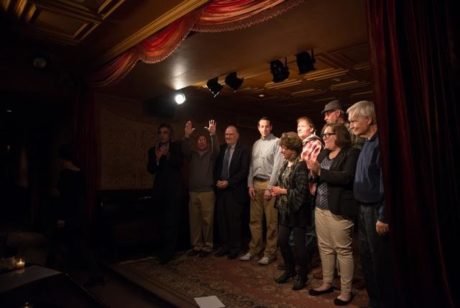Near the end of each year, Philadelphia’s only surreal theater, The Idiopathic Ridiculopathy Consortium (IRC) —with their deeply philosophical mission statement, “We Bring Good Nothingness to Life”—offers a benefit performance for the next season opener. However, the recent presidential election threw the cast and the directors for a loop as they had to rewrite the script, give up what they had already learned by heart, and rush to learn new lines. In spite of it all, the latest production of A Little Raw Onion at Philadelphia’s L’Etage Cabaret was performed before standing-room only crowds.

The cast of IRC actors treated the packed house to much mayhem from the many satires of The Onion, “America’s Finest News Source,” including these hilarious and often timely pieces: The First Rule Of The Quilting Society Is You Don’t Talk About The Quilting Society; With All Due Respect, I Choose Not To Go Fuck Myself; Ladies And Gentlemen Of The Jury, Marry Me!; Sometimes I Feel Like I’m the Only One Who Gives A Shit About Lustrous Hair; and If You Are Reading This I Am Already Gone.
The following popular IRC actors brought down the house with their straight-faced performances of the sublime and the ridiculous: Brian Adoff, Melissa Amilani, Tina Brock, John D’Alonzo, Tomas Dura, Sharon Geller, Michael Harrah, Teresa Leahy, Lee Pucklis, Bob Schmidt, David Stanger, and Bayard Walker.
I asked the actors to peel off layers of the onion, addressing these two points:
- Tell us about your Onion piece and your interpretation, and provide a few quotations to give us a flavor.
- Given the recent political upheaval, how do you see your Onion piece being part of a wider picture? For example, how do you see the surreal as a way of creating some relief, perhaps even some tikkun olam — repairing and healing the world—through theater?
And now, curtain up for The Onion, presented by the actors of the IRC:

David Stanger: There’s just no freaking way I’m redeeming that S.O.B.
My piece is a satirical response from Jesus Christ regarding his refusal to grant forgiveness to an especially obnoxious churchgoer. I like to think my performance captured his frustrations, in particular his contempt at the hypocrisy of this person’s humble church persona versus his cruel and self-centered day-to-day behavior. I think the line that best sums it up is: “I know I’ve said all are welcome at the table of the Lord, but there’s just no freaking way I’m redeeming that S.O.B.”
I would hope that now, more than ever, theater—and especially theater of the absurd—can be used as a counterbalance to the upheaval and atrocities we see in the world. I think absurdism and satire can be effective tools in allowing us a chance to see the incredulousness of a situation, but can be equally effective as a call to arms. And if nothing else, it allows us a chance to be united with our laughter—even if only for an evening.

Bob Schmidt: “Absurdist Theater shines a spotlight on the ridiculousness and pointlessness of it all.”
My piece, Son, You’ve Made a Mockery of Taco Night, is about a teenage son suggesting that his family try a few new dinner options and his father horribly overreacting, deeply morally offended by any suggestion of change or alteration to the family routine. To really highlight the ridiculousness of the situation, I tried to bring the same gravity of emotion that one would experience in a life-changing event and apply it to a simple Taco Tuesday family night.
It’s hard to pick out one particular line, since the piece covers all sorts of familial territory, but I think this paragraph captures a lot of it:
“You used to be such a good boy, content with the taco toppings and serving sizes I provided. But you’ve changed. The son I raised would never have asked to have chicken instead of taco meat, because that son would have been considerate of the fact that his mother slaved over that ground beef. Slaved, Joshua.”
The piece captures the hypersensitivity, closed-mindedness, and outright anger we see all around us in today’s climate. Let’s face it, we all need a little control and routine in our daily life—some more than others. Without it, the sheer absurdity and brutality of the modern world would drive us insane.
Theater of the absurd and publications like The Onion shine a spotlight on the absolute ridiculousness and pointlessness of it all. Hopefully, it will help us to stop taking everything so seriously, laugh a little about ourselves, and maybe even understand each other a bit better.
Hey, a guy can dream, can’t he?

Tina Brock: American Values, a relationship break-up letter from The US Constitution
The Onion piece I performed was entitled American Values, or: If You’re Reading This, I’m Already Gone — essentially a relationship break-up letter written by The US Constitution, addressed to the American People, showing that their relationship is no longer functional in the face of dissolving values. It conjures up the absurdities and shifting realities of the post-2016 presidential election period.
I play the role of “American Values,” voicing the text. John D’Alonzo, as “The Constitution,” says nothing but stands with the pages in hand, letting the Articles float in the air as the piece progresses. Below, one of my favorite lines:
“Maybe hearing all this is a shock to you, but trust me, everyone else has been able to see the warning signs for years, and they knew this was a long time coming. Deep down, I think you did, too.”
The writer captures the sadness, the incomprehension, the tragedy, and the disintegration of what we have come to understand as American Values—and what was, for many, the absurd journey and result of the last election process. So now, we all grapple with the Brave New World we have inherited and created—with a crumbling foundation as the roadmap.

John D’Alonzo: Changing and mistreating the US Constitution
“American Values” personifies the US Constitution, which is pissed about being changed and mistreated in our own time. Wearing a formal black suit, as the embodiment of the Constitution, I did not speak. I simply looked out to the audience and dropped pages of the Constitution during the reading—symbolizing the slipping away of its substance, as witnessed by this example: “You know what really bothers me, though? The way you keep trying to change me. It honestly makes me wonder if you ever really knew anything about me in the first place.”
Artistic Director Tina Brock, and the IRC provide a safe place for the actors and audiences to come together and find solace. Every season, Tina chooses plays packed with philosophical nuggets. Audience members take something with them after each show to help build bridges in communication and work toward understanding and healing.

Tomas Dura: “Artists have been criticized, even silenced, by authorities.”
“People, people, people! Put down your torches for a second. I know you’re all angry that, after days of bloody and terrifying rampage, the monster still hasn’t been caught. Your outrage is not unjustified; however, it’s misdirected.”
The speaker in my piece, This Monster Problem Is Distracting This Town From The Real Issues, tells the mob that it is letting a monster—which is destroying the town—get in the way of day-to-day problems that need to be addressed, as in typical scenes found in many monster movies where the townsfolk take up pitchforks and go after the monster on their own. There is usually a character that tries to provide a voice of reason, telling everyone that violence is not the answer and that innocent people might get hurt.
The text mentions torches and pitchforks, which would be consistent with peasants or farmers. When I came to the dress rehearsal, I came straight from work (as a landscaper)—wearing dirty dungarees, a flannel shirt, and work boots. I even brought my own pitchfork.
Theater has often commented on troubling developments in society by portraying stories whose sole purpose appeared to be to simply amuse an audience. Often contemporary characters and locations were given mythological or exotic names to protect the author. However, while being amused, audiences may have thought through what was really going on in the plays and in their own lives.
To challenge audiences, theater artists may resort to unorthodox techniques, breaking out of the rules of traditional theater. As we have seen in history, artists have been criticized, silenced, and even exiled by authorities just for departing from the accepted norms. However, if I can get an audience to feel compassion for someone who is being mistreated, or to recognize the wrong of any type of injustice, then, as an actor, I have done a pretty good job.

Brian Adoff: Full-throated, post-election laughs
My piece is called Ha! Ha! Ha! I Can’t Believe How Funny This Sitcom Is! and was written from the perspective of a personified laugh track for the show How I Met Your Mother.
At first glance, this is just a silly monologue with full-throated laughs (“Hold on—the tall lanky one is having a comically physical overreaction to a situation that hardly calls for it!”).
However, post-election, I found sub-textual meaning in lines like, “We all could use some lighthearted entertainment, couldn’t we? And you don’t even have to really get the joke or see why it’s funny—just sit back and follow my lead. Come on, loosen up a little!”
I definitely saw audience members nodding their heads in agreement when I earnestly delivered those lines.

Melissa Amilani: “Just because my client is a lost cause doesn’t mean we have to be!”
Originally, I chose a different monologue, but I switched pieces—my first choice hit a little too close to home after the election—and I’m so glad I gave Ladies and Gentlemen of The Jury, Marry Me! another look.
It was written for “Anthony Forster,” a male defense lawyer, and not “Annette,” but I felt like it made just as much sense, if not more, coming from a woman. Apart from the healing power of laughter, I think my piece was gratifying because we saw a bold proclamation of love to a “racially and demographically diverse group of peers” from a woman in a position of power.
And a few people told me that this monologue would help them get through jury duty the next day, so I’m happy to have made a positive impact there.

Sharon Geller: I’m Single, Grieving My Husband’s Death — and Ready to Mingle!
This is a piece about a middle-aged woman who had been happily married to the love of her life for many years. Following his sudden death, she finds herself in the uncomfortable position of having to date again, even though she doesn’t know that she isn’t ready for that step.
One of my favorite lines is, “Next, we’ll all head over to J.P.’s Bar, where I’ll throw back a few margaritas and see my dead husband’s face in everyone I meet.”
The challenge with this piece is to keep the laughs flowing and not make the audience feel too sad for this poor woman. Many of us can identify with having a spouse or long-term relationship that is no longer in our lives—for one reason or another.
I feel the only time since the election that my mood has been uplifted has been when I was performing on stage and making people laugh. The monologue reminded me that laughter is important, especially during times of stress and sadness. It serves as a reminder that not everything is dour. Theater and humor can provide tikkun olam, or a healing for people’s souls.
***
For IRC director Tina Brock’s thoughts on surreal theater in the post-election period, read Henrik’s interview with her on HowlRound.
The two hilarious shows at Philadelphia’s L’Etage Cabaret raised funds for the IRC’s February 2017 regional premiere of Jean Giraudoux’s The Enchanted at The Walnut Street Theatre, Studio 5, from February 7 – March 5, 2017.
For more information about IRC, visit their website.




